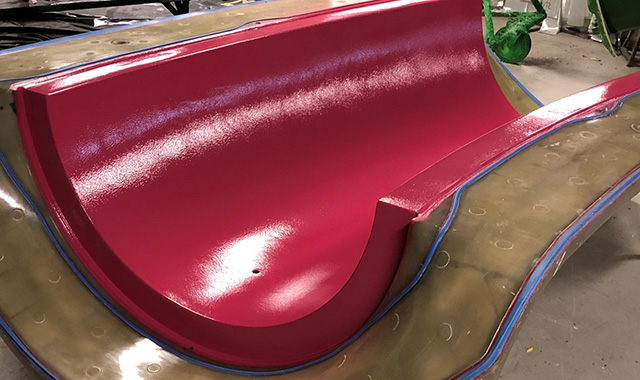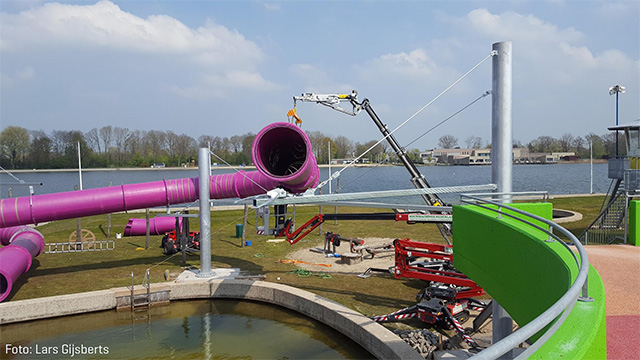Reading time: 3 minutes. Of interest to swimming pools, architects & consultants
Before bathers can enjoy the fun of plunging into the water, several steps have to be taken to construct the waterslide. The creation of a water slide in eight steps:
- Wishes & requirements
Regardless of whether it involves standard elements from our product range or a specific design idea, all designs start with an inventory of the client’s wishes, possibly in consultation with an architect and/or consultancy firm. What capacity should the slide be able to handle? What is the target group; for example, would a family slide or an exciting tyre slide suit the bathers better? What speed, colour and theming options are required? What multimedia effects do we need to add to entertain the target group? In close consultation with you, we ultimately compile a schedule of requirements, which we can then put into practice. - Design
Our in-house designers translate the client’s wishes into a digital slide design. In doing so, we pay close attention to achieving the right balance of excitement & safety and appearance & functional features. We proceed to establish a design that reflects the wishes expressed, while also vouching for comfortable and safe use. Our designer, Kirsten, has been persuaded to offer you a ‘peek behind the scenes’ into the job she does: read her story here. - Structure
We perform certain parts of the process in cooperation with experts. The safety standards for slides are highly stringent, we engage the services of an independent consultant to both provide advice and check our work, thus enabling us to construct a safe slide. For example, VIRO engineering calculates the reaction forces of the water slide on the ground for us; these serve as the basis for reliable foundations. In this phase, we also use software to calculate the sliding velocity of the water slide, so that we can adjust its course wherever necessary. VIRO can then adapt the stress calculations for the structure accordingly. - Final design
Once our joint design amendments have been incorporated to achieve the optimum slide gradient and a sound structure, the design can be finalized and the structural and engineering details drawn up. - Production
We also carry out the production process in cooperation with experts. The loadbearing structure of the water slide is made of steel. We outsource the manufacture of these steel parts to our preferred partners in the Netherlands.
We simultaneously forward the design for production of the polyester to our regular water attraction manufacturer, which has over 25 years of experience in this field. It then applies what is known as the hand lay-up technique to manually construct the waterslide parts layer by layer. A high-quality gel coating is applied to the mould, to which several layers of glass fibre matting are subsequently bonded using polyester resin. This makes for a sturdy laminated shell.
The cured glass-fibre reinforced polyester is finished with a protective coating, to ensure optimum resistance to the treated pool water. The coatings applied and the percentage of glass fibre in the glass fibre-reinforced polyester ultimately vouch for the quality level of the waterslide.

- Installation
Everything (literally) comes together during this phase: all parts and components are assembled and erected. We first install the entire steel structure. The polyester parts are assembled on the ground, to create components comprising three or four tube sections. These components are then attached to both the steel structure and one another. Hot-dip galvanised fastening materials are used (read more about the choice of this material in this article) to achieve this. The seams between the polyester components are made watertight with crown strip and perhaps also finished with an adhesive paste. The entire slide is then meticulously aligned, and thorough cleaning ultimately carried out to render the brand new waterslide spick and span.

- Testing
Before the waterslide can be opened to bathers, it has to be extensively tested to ensure correct operation and safety. First of all, the water attraction is tested for functionality: The water supply is connected, and the entire course of the slide is checked again. We then approach an independent party to carry out the legally required safety check. The organisation known as Keurmerkinstituut is one such party. Such bodies have often already been involved in the process in the capacity of a design consultant. All aspects of the completed water attraction are inspected, including the loadbearing structure, installation method and materials used. Of course, “test rides” are also carried out, to assess the slide experience. After approval, the inspector ultimately issues a certificate and the water slide may be delivered. - Delivery & commissioning
We consider it is important to go over everything one last time, together with the client (and architect/consultancy firm). Maintenance tips are also discussed here: the life span of the waterslide can be considerably extended by performing a few simple chores between each scheduled service. When all the formalities have been completed satisfactorily, the slide fun can begin!
Coordination & advice
During the weeks immediately prior to delivery, countless operations are performed and many people are involved in the process. We coordinate this process from A to Z in order to relieve the client of any worries. We also perform advisory and connecting roles during the process, to ensure that design ideas actually come to life. Want to learn more about the process or the possibilities available? Please contact us for further information and tailored advice.
Want to stay informed about our developments? If so, then follow us on LinkedIn or subscribe to our newsletter.


Downloads